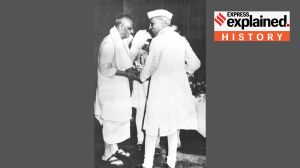Stay updated with the latest - Click here to follow us on Instagram
Citys health in critical condition
Mumbai is definitely not a city in the pink of its health.
Mumbai is definitely not a city in the pink of its health. Besides creaking physical infrastructure,the citys social infrastructure too is shaky. Its state of health,particularly,is raising red flags.
The incidence of nine sensitive diseases has almost doubled in the past four years,according to a report on the citys state of health prepared by Praja Foundation,a voluntary organisation working on urban and civic issues. The report is based on a survey of 15,000 households across various wards in the city.
While the incidence of diseases has risen,Mumbaikars seem to be heading towards private clinics and hospitals more. Almost 75 per cent of Mumbaikars avoid going to municipal health centres or state hospitals,said Nitai Mehta,founder trustee of Praja Foundation. Not surprising then that more than 30 per cent of households spend more than one-tenth of their annual income on medical costs alone.
While costs in private clinics are definitely higher,what is more disturbing is that 80 per cent Mumbaikars do not have a medical insurance.
An average spending of 11 per cent of annual income on hospitals can be backbreaking for households,especially those in the lower income strata.
The city may continue to suffer from a host of sensitive diseases,but peoples representatives seem to have little interest in highlighting health issues to the government,according to Praja Foundation.
Data obtained through Right to Information (RTI) queries by the organisation reveals that only 6.56 per cent of the total questions asked in the six Assembly sessions in 2010 were health related. This rose marginally to 7.08 per cent in 2011. Of the total 9,665 questions raised in the Assembly,the 32 MLAs representing Mumbai asked just 685 health questions in 2011. In 2010,706 health questions were raised of the total 10,759.
Even at the general body meeting of Brihanmumbai Municipal Corporation (BMC),only 32 corporators of the total 226 asked questions regarding health. These made up just 11 per cent of the total questions asked.
Dr Pednekar,director (research and development),Healis Sekhsaria Institute for Public Health who monitored the study said: There is a need to set up strong surveillance systems in the health information system in the city. This data will help prepare better policies at the macro level.
The analysis of data on various diseases shows that the incidence of dengue rose the highest or 176 per cent during the past four years since 2008-09. The incidence of malaria jumped 71 per cent during the period and diarrhoea 23 per cent.
The information has been gathered through responses to RTI queries from all 160 municipal dispensaries,24 municipal hospitals and four state-run hospitals.







